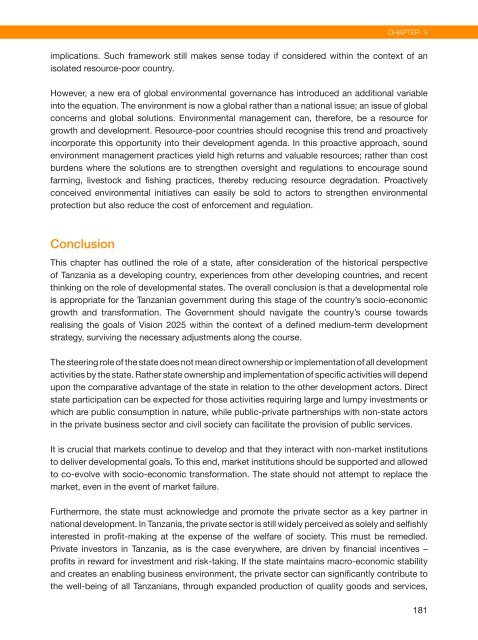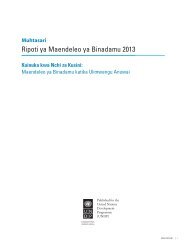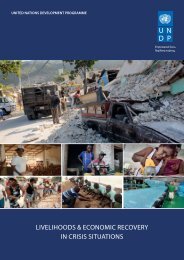Poverty and Human Development Report 2009 - UNDP in Tanzania
Poverty and Human Development Report 2009 - UNDP in Tanzania
Poverty and Human Development Report 2009 - UNDP in Tanzania
You also want an ePaper? Increase the reach of your titles
YUMPU automatically turns print PDFs into web optimized ePapers that Google loves.
implications. Such framework still makes sense today if considered with<strong>in</strong> the context of an<br />
isolated resource-poor country.<br />
However, a new era of global environmental governance has <strong>in</strong>troduced an additional variable<br />
<strong>in</strong>to the equation. The environment is now a global rather than a national issue; an issue of global<br />
concerns <strong>and</strong> global solutions. Environmental management can, therefore, be a resource for<br />
growth <strong>and</strong> development. Resource-poor countries should recognise this trend <strong>and</strong> proactively<br />
<strong>in</strong>corporate this opportunity <strong>in</strong>to their development agenda. In this proactive approach, sound<br />
environment management practices yield high returns <strong>and</strong> valuable resources; rather than cost<br />
burdens where the solutions are to strengthen oversight <strong>and</strong> regulations to encourage sound<br />
farm<strong>in</strong>g, livestock <strong>and</strong> fish<strong>in</strong>g practices, thereby reduc<strong>in</strong>g resource degradation. Proactively<br />
conceived environmental <strong>in</strong>itiatives can easily be sold to actors to strengthen environmental<br />
protection but also reduce the cost of enforcement <strong>and</strong> regulation.<br />
Conclusion<br />
Chapter 3<br />
This chapter has outl<strong>in</strong>ed the role of a state, after consideration of the historical perspective<br />
of <strong>Tanzania</strong> as a develop<strong>in</strong>g country, experiences from other develop<strong>in</strong>g countries, <strong>and</strong> recent<br />
th<strong>in</strong>k<strong>in</strong>g on the role of developmental states. The overall conclusion is that a developmental role<br />
is appropriate for the <strong>Tanzania</strong>n government dur<strong>in</strong>g this stage of the country’s socio-economic<br />
growth <strong>and</strong> transformation. The Government should navigate the country’s course towards<br />
realis<strong>in</strong>g the goals of Vision 2025 with<strong>in</strong> the context of a def<strong>in</strong>ed medium-term development<br />
strategy, surviv<strong>in</strong>g the necessary adjustments along the course.<br />
The steer<strong>in</strong>g role of the state does not mean direct ownership or implementation of all development<br />
activities by the state. Rather state ownership <strong>and</strong> implementation of specific activities will depend<br />
upon the comparative advantage of the state <strong>in</strong> relation to the other development actors. Direct<br />
state participation can be expected for those activities requir<strong>in</strong>g large <strong>and</strong> lumpy <strong>in</strong>vestments or<br />
which are public consumption <strong>in</strong> nature, while public-private partnerships with non-state actors<br />
<strong>in</strong> the private bus<strong>in</strong>ess sector <strong>and</strong> civil society can facilitate the provision of public services.<br />
It is crucial that markets cont<strong>in</strong>ue to develop <strong>and</strong> that they <strong>in</strong>teract with non-market <strong>in</strong>stitutions<br />
to deliver developmental goals. To this end, market <strong>in</strong>stitutions should be supported <strong>and</strong> allowed<br />
to co-evolve with socio-economic transformation. The state should not attempt to replace the<br />
market, even <strong>in</strong> the event of market failure.<br />
Furthermore, the state must acknowledge <strong>and</strong> promote the private sector as a key partner <strong>in</strong><br />
national development. In <strong>Tanzania</strong>, the private sector is still widely perceived as solely <strong>and</strong> selfishly<br />
<strong>in</strong>terested <strong>in</strong> profit-mak<strong>in</strong>g at the expense of the welfare of society. This must be remedied.<br />
Private <strong>in</strong>vestors <strong>in</strong> <strong>Tanzania</strong>, as is the case everywhere, are driven by f<strong>in</strong>ancial <strong>in</strong>centives –<br />
profits <strong>in</strong> reward for <strong>in</strong>vestment <strong>and</strong> risk-tak<strong>in</strong>g. If the state ma<strong>in</strong>ta<strong>in</strong>s macro-economic stability<br />
<strong>and</strong> creates an enabl<strong>in</strong>g bus<strong>in</strong>ess environment, the private sector can significantly contribute to<br />
the well-be<strong>in</strong>g of all <strong>Tanzania</strong>ns, through exp<strong>and</strong>ed production of quality goods <strong>and</strong> services,<br />
181





